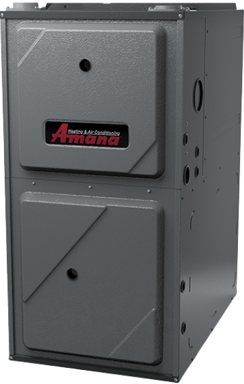Once you've decided to go with a central gas furnace for your heating system, there are many important elements to consider. One is whether you want a condensing furnace or a standard, non-condensing furnace.
So what exactly is the difference between the two, and how do they affect your heating bills?
Non-Condensing Furnaces: One Heat Exchanger
A heat exchanger is a vital part of a gas furnace, as it heats the passing air before it is sent back through your home. To read more detailed information on how the components of a central gas furnace work, click here. In short, during the normal combustion process, fuel combusts inside the heat exchanger to release heat. Some of the heat produced during this process is lost and turned into water vapor and exhaust gases.
These exhaust gases are carried out of the furnace via a flue pipe, which acts as a chimney that funnels the gases into the outside air. This means that standard, non-condensing gas furnaces waste a significant amount of fuel and potential heat as the gases leave the heat exchanger.
Specifically, non-condensing furnaces have an average of an 80% AFUE rating. In other words, they are about 80% efficient-- meaning they waste about 20% of energy.
Condensing Furnaces: Two Heat Exchangers

That’s where a condensing furnace comes in. A condensing furnace has a second heat exchanger that takes this water vapor and exhaust gas and squeezes more heat out of those fumes. The result is a much more energy-efficient heating system.
In fact, condensing gas furnaces can have AFUE ratings of 90% to 98%, meaning they are around 10% to 20% more efficient than standard non-condensing furnaces. And since a typical furnace lasts 15 to 20 years on average, a more efficient system will save you a significant amount of money in the long run.
Not only are condensing furnaces more efficient, but they also run at a lower capacity, resulting in more even temperatures throughout the home. With a condensing furnace, you will be able to save money and experience higher comfort.
Deciding Between Non-Condensing & Condensing
Now that you know what makes these furnaces differ, here are some other factors that you and your local professional should consider when choosing the best type of gas furnace for your home:
-
How long you plan to stay in your home: Condensing gas furnaces are a great long-term investment. Energy efficiency means you'll save money over the years, but it may not be financially worth it if you won't be in your home for a long time.
-
The condition of your home's ductwork: If your ductwork has leaks, then you will lose a large part of your heated air. So, even if you opt for the more energy-efficient condensing gas furnace, you will lose energy -- and money -- through the openings in the ducts.
- Your home's insulation levels: If your home has poor insulation or areas where air could easily escape/come in, you will lose energy as well. That means you won't really be able to see the energy savings of a condensing furnace.
-png.png)
-
The other features of the furnace: A non-condensing furnace is less efficient by itself, but may have features like a modulating burner or variable-speed blower that improve efficiency. In this scenario, energy savings could be comparable to that of a condensing furnace.
-
Your budget: With all that said, your budget may be of higher importance to you. If long-term savings aren't relevant to you and you are just looking for a less expensive option, you will want to opt for a non-condensing furnace. The second heat exchanger and special venting required for a condensing furnace both drive the price tag up a bit.
Keep in mind, efficiency is not all you will need to consider when choosing the best gas furnace for your home. It's important to get help from your local contractor to go over all the options that make sense.
If you live in the Delaware Valley/Greater Philadelphia area and would like to find comfort within your home, visit our website or give us a call at 215 - 245 - 3200 to learn more.





